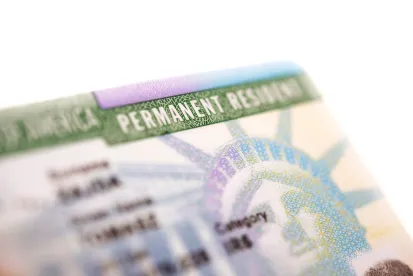Since the start of the COVID-19 pandemic, US immigration agencies have continued offering minor, but welcome, accommodations to individuals affected by COVID-19 who rely on immigration programs. While there are no groundbreaking changes, here is a roundup of the most notable changes in the last two months.
US Department of Labor (DOL)
-
DOL posting requirements: Shortly after our initial entry regarding compliance with DOL posting requirements for remote employees, DOL issued an FAQ confirming our analysis, with minor accommodations to account for disrupted operations due to COVID-19.
-
Posting notices for H-1B, H-1B1, and E-3 workers: While employers are still required to post notices at a new worksite and even file new petitions under some circumstances, DOL is allowing employers to post notices (if required) “as soon as practical and no later than 30 calendar days after the worker begins work at the new worksite locations.” It is unclear whether DOL will conduct worksite inspections and/or audits of public access files to ensure that employers have complied with the 30-day exception, or how flexible the agency will be in overlooking lack of compliance. To avoid being in violation of the requirements, the conservative approach for employers is to post the required notices within 30 days.
-
Posting notices for PERM labor certification: In the same FAQ, DOL also confirmed that the PERM Notice of Filing must be physically posted at the worksite for at least 10 consecutive business days and at least 30 days before the date an ETA Form 9089 is filed. Unfortunately, DOL does not offer any flexibility on this posting requirement. However, for recruitments initiated within the 180 days preceding March 13, 2020, DOL will accept Notices of Filing that were posted within 60 days after the regulatory filing dates have passed in order to accommodate employers who have closed their worksites.
-
Extension of deadlines: In the same FAQ, DOL provides alternative options for responding to requests and notifying the agency of changes affecting applications. Most importantly, DOL will grant requests to extend deadlines for employers to respond to DOL’s inquiries, including Requests for Information, Notices of Deficiency, and Notices of Audit.
US Citizenship and Immigration Services (USCIS)
-
Local office closures: On May 6, 2020, USCIS extended the closure of all local offices through June 3, 2020. Although the agency subsequently announced that offices would begin reopening on June 4, no specific offices have reopened at this time. All routine in-person services, including interviews for adjustment of status, naturalization and asylum and appointments for information and biometrics or fingerprinting, remain suspended. USCIS will process EAD renewal applications using previously submitted biometrics to avoid further delaying the adjudication of time sensitive renewals. The public should check the USCIS Office Closings website for updates on a regular basis.
-
Regional service centers: Operations have not been significantly affected by the pandemic. We have even noticed a slight improvement in real-time processing times for petitions, perhaps due to the reassignment of adjudicators who are normally assigned to local offices that remain closed.
-
Extension of time to file time-sensitive responses: On May 1, 2020, USCIS extended the flexibilities initially announced on March 30, 2020, for accepting time-sensitive responses to Requests for Evidence, Notices of Intent To Deny, Notices of Intent to Revoke, and similar agency requests, as well as the deadlines for filing Notices of Appeal or Motions To Reconsider and Reopen on Form I‑290B. For all requests and denials issued between March 1 and July 1, 2020, USCIS will consider timely filed all submissions received within 60 calendar days after the response/filing due date. USCIS also reminded the public of its ongoing discretion to excuse the late filing of an extension or change of status petition on Forms I-129 and I-539 due to Special Situations such as the COVID-19 pandemic; for example, by accepting nunc pro tunc.
-
Requests for Initial Evidence for medical reports for individuals whose in-person interviews have been cancelled: While we are not sure how widespread the practice is at this time, we are seeing USCIS issue written requests for medical examination reports (Forms I-693) for employment-based applicants whose required in-person interviews have been cancelled due to the pandemic. This is a departure from the usual “courtesy notices” that have been issued by USCIS for some time, requesting that applicants take medical reports to their interviews. In some cases, we have seen USCIS adjudicate green card applications to approval, without interview, after receiving the medical reports and we are cautiously optimistic that that sensible policy will continue or that in‑person interviews will be brief and procedural once local offices reopen.
-
ESTA satisfactory departure: USCIS has started using its discretion to grant a 30-day period of satisfactory departure, as well as a second such period when warranted, for tourists and business visitors who are unable to depart on time due to the outbreak. Individuals may request the accommodation by calling the USCIS Contact Center.
-
Electronic copies of original signatures: While USCIS has not made more forms availabe for electronic filing during the pandemic, the agency continues to accept copies of ink signatures on forms that normally require original (ink) signatures.
-
Form I-9s: USCIS continues to relax I-9 requirements. Please review our most recent entry regarding I-9s and monitor our blog for up-to-date information on any new flexibilities.
US Department of State (DOS)
-
Closures of US embassies and consulates: All US embassies and consulates remain closed and all routine visa appointments worldwide remain temporarily suspended.
-
While anecdotal at this time, some individuals have reported being able to secure appointments at some US consular posts for July and August 2020, even though all posts are currently listing “Emergency Appointments Only.” This may be a sign that consular posts will reopen at some point over the summer.
-
As part of DOS’s strategy to provide “emergency and mission critical visa services,” embassies and consulates will continue to process H-2 cases, considered to be “essential to the economy and food security of the United States,” as well as a “national security priority.”
-
The Visa Waiver Program (commonly called “ESTA”) is not currently affected by the pandemic, and applications continue to be processed. However, as a reminder, travelers should not use ESTA (whether valid or newly issued) to attempt to travel to the US if they have been present in a Schengen country, the United Kingdom, China, Iran, or Brazil within 14 days of their travel to the U.S. as outlined here and (regarding Brazil) here.
-
Suspension of immigrant visa admissions: The most recent update relates to the presidential proclamation entitled “Proclamation Suspending Entry of Immigrants Who Present Risk to the U.S. Labor Market During the Economic Recovery Following the COVID-19 Outbreak.”
-
As we have previously indicated, the scope of the Proclamation remains limited to those who obtain immigrant visas at US embassies or consulates. Its effects remain speculative and uncertain until embassies and consulates reopen and start processing visas again.
-
As set out in the Foreign Affairs Manual, immigrant visas are allocated on a monthly and annual basis based on mandated numerical and per-country ceilings for each preference category of eligibility. Theoretically, if overall demand across a category is lower than the overall quota for the category, then unused numbers could be reallocated to other categories, including to applicants for adjustment of status in the United States. Please stay tuned for an upcoming blog piece on the potential effect of the Proclamation on green card availability for other categories of immigrants.
-
COVID-19 country-specific information: DOS is still maintaining its website, which provides up-to-date country-specific information on the status of the outbreak in every country.
US Customs and Border Protection (CBP)
-
Port-of-entry applications: There is still no official guidance related to any process changes at ports of entry, other than what we reported on April 20, 2020. However, it appears that most land ports of entry and airport preclearance offices are still processing initial and renewal applications on a case-by-case basis. Applicants or their counsel should check in advance with specific ports before making final travel arrangements.
-
ESTA satisfactory departure: Since our last blog entry on how the outbreak affects ESTA travelers and the accommodations offered by CBP, USCIS has followed suit in issuing satisfactory departure on a discretionary basis. See “USCIS” above.
On a final, positive note, the Congressional Research Service issued guidance on April 7, 2020, entitled “Recovery Rebates and Unemployment Compensation under the CARES Act: Immigration-Related Eligibility Criteria”, and on May 1, 2020, on “Noncitizens and Eligibility for the 2020 Recovery Rebates”. Both documents clearly outline the conditions under which noncitizens are eligible to receive Economic Impact Payments and, as we noted in our blog in April, unemployment benefits paid for through payroll taxes. Most importantly, the CRS guidance clarifies that receiving an Impact Payment or unemployment benefits will not be considered in the government’s dreaded public charge assessment for both nonimmigrants and immigrants.




 />i
/>i

